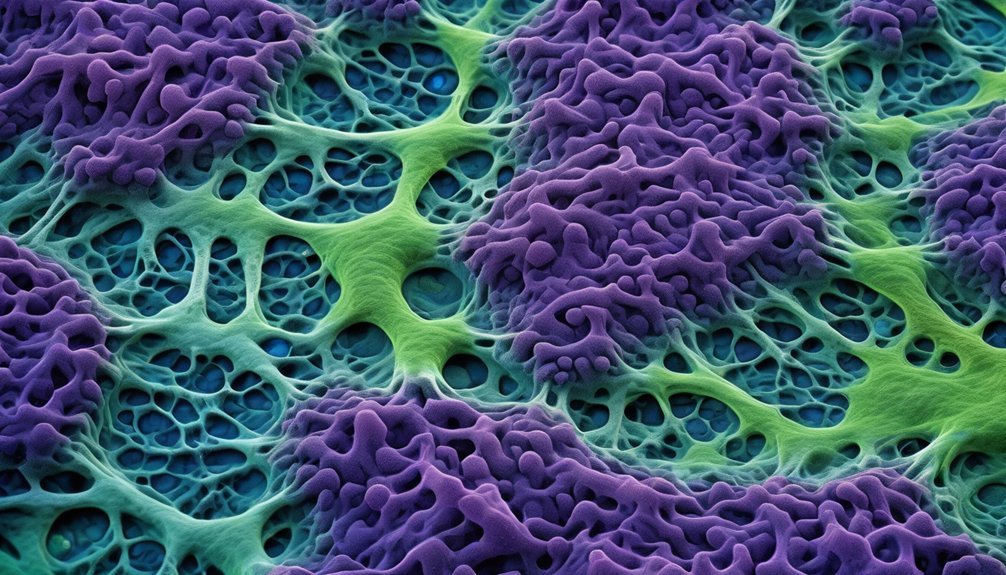You may not be aware that immunotherapy, a groundbreaking cancer treatment, is revolutionizing how we combat cancer by leveraging the body's immune system. Exploring natural alternatives to enhance immune function presents a promising avenue for those seeking comprehensive health support. By understanding the synergy between immunotherapy and natural approaches, you can potentially optimize your well-being and treatment outcomes.
Key Takeaways
- Immunotherapy boosts the body's immune response against cancer.
- Herbal supplements can support immune function but require expert guidance.
- Dietary changes like eliminating trigger foods and consuming whole foods benefit overall health.
- Lifestyle modifications, including stress management and exercise, enhance immune function.
- Integrating natural therapies like meditation and acupuncture can complement immunotherapy treatments.
What Is Immunotherapy?
Immunotherapy is a cutting-edge treatment approach that harnesses the power of the body's immune system to fight against diseases such as cancer. This innovative method has shown remarkable effectiveness in treating various types of cancer by enhancing the immune system's ability to recognize and destroy cancer cells. By leveraging the body's natural defenses, immunotherapy offers a promising alternative to traditional treatments like chemotherapy and radiation therapy.
While the benefits of immunotherapy are substantial, it's essential to consider potential side effects that may arise during treatment. Common side effects of immunotherapy include fatigue, skin reactions, flu-like symptoms, and inflammation at the injection site. These side effects vary in severity depending on the individual's response to treatment and the specific type of immunotherapy being administered.
Understanding both the effectiveness and potential side effects of immunotherapy is crucial for patients considering this treatment option. Consultation with healthcare professionals can provide valuable insights into the suitability of immunotherapy for individual cases, helping individuals make informed decisions about their treatment journey.
Types of Immunotherapy
Harnessing the body's immune system to combat diseases like cancer involves various types of treatments. Immunotherapy options encompass a range of approaches aimed at enhancing the body's ability to recognize and fight cancer cells.
Some common types include:
- Checkpoint inhibitors
- CAR-T cell therapy
- Monoclonal antibodies
- Cytokines
- Cancer vaccines
Each of these treatments works in distinct ways to stimulate the immune system and target cancer cells specifically.
The effectiveness of immunotherapy can vary depending on the type of cancer, the stage of the disease, and individual patient factors. While some patients may respond well to a particular immunotherapy option, others may not experience the same level of benefit.
Understanding the different types of immunotherapy and their specific mechanisms of action is crucial in determining the most appropriate treatment for each patient. It's essential for healthcare providers to assess the potential benefits and risks of each immunotherapy option to optimize treatment effectiveness and improve patient outcomes.
Mechanism of Immunotherapy

Activating the body's immune system to target cancer cells involves mechanisms that play a crucial role in the efficacy of immunotherapy. The immunotherapy process utilizes various approaches to stimulate the immune system to recognize and destroy cancer cells. One key mechanism is through immune checkpoint inhibitors, which block proteins that inhibit the immune response, allowing T cells to recognize and attack the cancer cells effectively.
Another approach involves adoptive cell transfer, where immune cells are modified and reintroduced into the body to enhance their cancer-fighting abilities.
Immune system interactions are integral to the success of immunotherapy. Cancer cells can evade detection by the immune system through various mechanisms, such as downregulating immune responses or expressing proteins that suppress immune activity. Immunotherapy works by overcoming these evasion tactics, reactivating the immune response to target and eliminate cancer cells.
Understanding the intricate immunotherapy process and the complex immune system interactions is crucial for developing effective cancer treatments that harness the body's natural defenses against cancer.
Benefits of Immunotherapy
By enhancing the body's immune response against cancer cells, immunotherapy offers a promising approach to cancer treatment. Immunotherapy works by boosting the immune system's ability to recognize and attack cancer cells more effectively. This form of treatment harnesses the power of the body's natural defenses, providing a targeted and personalized approach to fighting cancer.
One of the key benefits of immunotherapy is its ability to support the immune system in identifying and destroying cancer cells throughout the body. Unlike traditional treatments like chemotherapy, which can have widespread effects on healthy cells, immunotherapy specifically targets cancer cells, minimizing damage to normal tissues.
Additionally, immunotherapy offers a range of treatment options, including checkpoint inhibitors, CAR-T cell therapy, and cancer vaccines. These diverse approaches allow for tailored treatment plans that can be customized based on the individual's specific type of cancer and immune response.
Limitations of Immunotherapy

Immunotherapy has shown significant promise in cancer treatment, primarily by leveraging the body's immune system to target and combat cancer cells effectively. However, like any other treatment, it has its limitations. One key concern is the possibility of side effects. While immunotherapy is generally well-tolerated, it can lead to immune-related adverse events such as fatigue, skin reactions, or digestive issues. These side effects can vary in severity and may require close monitoring and management by healthcare providers.
Another limitation of immunotherapy is related to its long-term efficacy. While many patients initially respond well to immunotherapy, some may experience relapses or develop resistance over time. This challenge underscores the importance of ongoing research to enhance the durability of treatment responses and improve outcomes for patients undergoing immunotherapy.
| Limitations of Immunotherapy | |||
|---|---|---|---|
| Side Effects | Long-Term Efficacy |
Natural Alternatives Overview
Exploring natural alternatives to complement traditional cancer treatments is a topic of growing interest. Plant-based solutions and holistic approaches are gaining recognition for their potential benefits in supporting overall health and well-being during cancer treatment.
Plant-based solutions involve the use of natural compounds derived from plants, such as fruits, vegetables, herbs, and spices, that are rich in antioxidants and other bioactive compounds known for their immune-boosting properties. These natural alternatives can help enhance the body's defenses against cancer cells and reduce inflammation, promoting a more balanced internal environment.
Holistic approaches focus on treating the whole person, considering physical, mental, emotional, and spiritual aspects of health. By incorporating practices like acupuncture, meditation, yoga, and massage therapy, individuals can improve their overall quality of life and support their body's natural healing processes.
These complementary therapies can help manage treatment side effects, alleviate stress, and enhance the immune system's response to cancer. Embracing plant-based solutions and holistic approaches alongside traditional cancer treatments may offer a more comprehensive and integrative approach to combating cancer.
Herbal Remedies

Herbal remedies have been utilized for centuries as natural sources of healing compounds that may offer potential benefits in supporting various aspects of health and well-being. Herbal supplements, derived from plant extracts, contain bioactive compounds that have been studied for their medicinal properties.
For example, Echinacea is known for its immune-boosting effects, while turmeric possesses anti-inflammatory properties.
When considering herbal remedies, it's essential to consult with a healthcare provider or a qualified herbalist to ensure safety and proper usage. While herbal supplements can be beneficial, they can also interact with medications or have side effects, underscoring the importance of expert guidance.
Research on herbal remedies is ongoing, with some studies suggesting their potential in supporting immune function, reducing inflammation, and promoting overall wellness.
Incorporating herbal supplements into your routine should be done thoughtfully, considering factors like quality, dosage, and individual health needs. By leveraging the power of plant extracts through herbal remedies, you may explore natural alternatives to support your health goals.
Dietary Changes
Considering dietary changes can play a significant role in supporting your overall health and well-being. When addressing food sensitivities, it's crucial to identify and eliminate any trigger foods that may be causing inflammation or immune responses. Certain foods, such as gluten, dairy, or artificial additives, can exacerbate existing health conditions or compromise your immune system. Maintaining a balanced and varied diet rich in whole foods, fruits, and vegetables can help reduce the risk of triggering food sensitivities.
Furthermore, gut health is closely linked to the immune system. A healthy gut microbiome is essential for proper immune function and overall well-being. Including probiotic-rich foods like yogurt, kefir, or fermented vegetables can help promote a diverse and thriving gut flora.
Fiber-rich foods such as whole grains, legumes, and nuts also support gut health by providing nourishment for beneficial gut bacteria.
Lifestyle Modifications

How can lifestyle modifications impact your immune system and overall health?
Stress management plays a crucial role in immune function. Chronic stress can weaken the immune system, making you more susceptible to illnesses. Engaging in stress-reducing activities such as meditation, deep breathing exercises, or spending time in nature can help support a healthy immune response.
Exercise routines also play a significant role in enhancing immune function. Regular physical activity can improve circulation, reduce inflammation, and promote the production of immune cells. Aim for at least 150 minutes of moderate-intensity exercise per week to boost your immune system.
Incorporating these lifestyle modifications can contribute to a stronger immune system and better overall health. By managing stress effectively and maintaining a consistent exercise routine, you can support your body's natural defense mechanisms. Prioritizing these lifestyle changes can have a positive impact on your immune system, helping you stay healthy and resilient.
Mind-Body Practices
To enhance your immune system and overall well-being, incorporating mind-body practices into your daily routine can be beneficial. Meditation benefits have been extensively studied and shown to reduce stress, improve concentration, and enhance emotional well-being. By calming the mind and reducing stress, meditation can have a positive impact on your immune system, helping it function more effectively.
Breathing techniques are another essential aspect of mind-body practices that can aid in boosting your immune system. Deep breathing exercises can help reduce inflammation in the body, promote relaxation, and enhance oxygen flow to your cells, supporting overall health and immunity. By practicing deep breathing regularly, you can improve your lung function, reduce anxiety, and enhance your body's ability to fight off infections.
Incorporating meditation and breathing techniques into your daily routine can be a simple yet powerful way to support your immune system and promote overall health. Start with just a few minutes each day and gradually increase the duration as you become more comfortable with these practices.
Integrating Natural Therapies

Natural therapies offer a complementary approach to conventional medical treatments, focusing on harnessing the healing properties of nature to support the body's immune system and overall health. Embracing a holistic approach, integrating natural therapies alongside immunotherapy can provide a more comprehensive treatment plan.
Complementary options such as herbal supplements, acupuncture, meditation, and dietary changes can enhance the effectiveness of immunotherapy and contribute to overall well-being.
Herbal supplements like echinacea, turmeric, and green tea possess immune-boosting properties that may aid in strengthening the body's defenses. Acupuncture, a traditional Chinese medicine practice, aims to restore the body's balance and improve energy flow, potentially supporting the immune system. Meditation and mindfulness techniques can help reduce stress, which is known to have a negative impact on immune function. Additionally, dietary changes incorporating more fruits, vegetables, and whole grains can provide essential nutrients that support immune health.
Precautions and Considerations
When considering the integration of natural therapies with immunotherapy, it's essential to be mindful of potential precautions and considerations. Patient safety is paramount when exploring complementary treatments alongside conventional immunotherapy. Here are three crucial points to bear in mind:
- Safety Concerns: Some natural products may interact with immunotherapy drugs, affecting their efficacy or causing adverse reactions. It's vital to consult with healthcare providers before starting any new supplements or alternative therapies.
- Patient Education: Patients should be well-informed about the potential benefits and risks of combining natural remedies with immunotherapy. Understanding how these treatments may interact can empower individuals to make informed decisions about their care.
- Monitoring and Communication: Regular monitoring by healthcare professionals is essential to track the effects of both immunotherapy and natural therapies. Open communication between patients, oncologists, and other healthcare providers is crucial for ensuring coordinated and safe care.
Frequently Asked Questions
Can Immunotherapy Cure All Types of Cancer?
Immunotherapy, while promising, has limitations in curing all types of cancer. Research shows that its effectiveness varies based on cancer type and individual response. Although immunotherapy has shown success in treating certain cancers, it may not be a universal cure.
It's essential to consult with healthcare professionals to understand the potential benefits and limitations of immunotherapy for specific types of cancer.
Are There Any Side Effects of Natural Alternatives?
Potential risks exist with natural alternatives. While many are safe, some may cause side effects. For instance, herbal supplements can interact with medications. Always consult with a healthcare provider before trying natural remedies, particularly if undergoing cancer treatment.
It's essential to consider both the benefits and potential risks to make informed decisions about incorporating natural alternatives into your healthcare regimen. Take precautions and prioritize your well-being when exploring these options.
How Can I Integrate Natural Therapies With Conventional Treatments?
To integrate therapies effectively, consider a holistic approach. Discuss your natural therapies with healthcare providers to ensure compatibility with conventional treatments. Collaboration is key to creating a comprehensive care plan. Monitor your progress closely, noting any changes or improvements.
Are There Specific Dietary Changes That Can Boost Immunity?
To boost immunity, consider incorporating superfoods like berries, leafy greens, and nuts into your diet. These foods are rich in antioxidants and essential nutrients that support immune function.
Additionally, focus on improving gut health by consuming probiotic-rich foods such as yogurt and fermented vegetables. A healthy gut microbiome is crucial for a strong immune system.
Prioritize these dietary changes to enhance your body's natural defense mechanisms.
What Are the Precautions When Combining Immunotherapy With Herbal Remedies?
When combining immunotherapy with herbal remedies, be cautious of potential interactions. Some herbs can affect the efficacy of immunotherapy medications, leading to reduced effectiveness or adverse effects.
Always consult with your healthcare provider before adding herbal remedies to your treatment plan. They can provide guidance on safe combinations and help you avoid any risks associated with mixing these therapies.
Prioritizing your health and well-being is crucial when considering complementary treatments.
Conclusion
In conclusion, understanding the power of immunotherapy and natural alternatives can be a game-changer in the fight against cancer. By integrating herbal supplements, dietary changes, lifestyle modifications, and mind-body practices, you can supercharge your immune system to heights beyond imagination. Remember, the key to success lies in harnessing the body's innate ability to heal and protect itself, paving the way for improved treatment outcomes and a higher quality of life.





